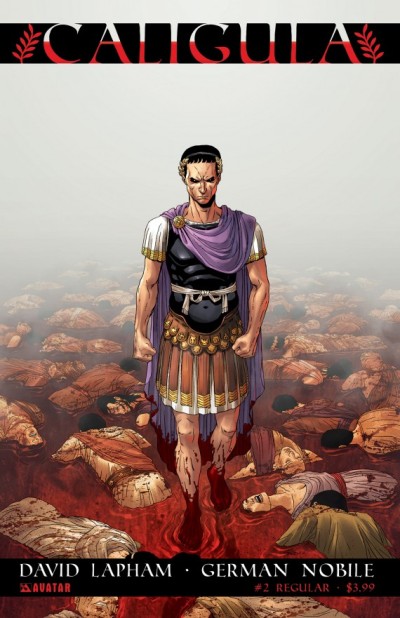Caligula 1
Reviewed by Peter Campbell 12-Apr-11
Oh look: someone’s been watching HBO’s Spartacus and has decided to rip it off. This isn’t necessarily a bad thing. There’s a long tradition of comics inspired by popular TV series and films, and some of the results have been as good or have exceeded the standards set by their source of inspiration. This is one of the better ones.
Oh look: someone’s been watching HBO’s Spartacus and has decided to rip it off. This isn’t necessarily a bad thing. There’s a long tradition of comics inspired by popular TV series and films, and some of the results have been as good or have exceeded the standards set by their source of inspiration. This is one of the better ones.
Caligula’s subject matter isn’t exactly subtle, but subtlety is probably not what you’re looking for if you’re picking up a comic about Rome’s most notorious emperor. You want sex? It’s here. Death and mutilation? It’s on virtually every page. Historical accuracy? Well, perhaps not, but it doesn’t really matter because the image that has built itself around the very name of Caligula is much more powerful than the hotly debated reality.
Taken as a work of fiction, it held my interest. Part of this attraction is, of course, puerile. It’s the equivalent of one of those newspaper articles that pretends to hold high moral ground about some scandalous piece of gossip, while allowing itself to repeat the detail and in the process titillate the readership. It’s a voyeuristic pleasure.
The story that David Lapham presents is essentially a revenge fable. The narrator, Junius, discovers his family raped and murdered, and vows to take revenge on Caligula. Unfamiliar with the complexities of Roman city life, he’s shown to be both determined and naïve. Most of the issue is taken up with setting up background information, which leads to a dénouement that thwarts expectations as to where the storyline is heading next issue.
Considering the potential for sheer awfulness that the excesses of Caligula’s reign could have invited, Lapham opts for restraint. Acts of violence are seldom shown as they occur. They’re described, and we’re shown their aftermath, and imagination acts as the binding element. The writing’s literate, and mostly avoids mock archaisms.
This restrained quality is matched by Nobile’s art. It’s painted in muted colours, and there’s a pleasing stylised angularity to the figurework. At the same time, its detailing is quite crude in places, and there’s sometimes the feeling that the painted art disguises the cohesion of the overall page design.
The real drawback here is the way in which the comic has been presented. Told primarily in the form of monologue, and with little in the way of dialogue, this combines with the painted art to create the feeling at times that you’re reading a sexed-up version of a Classics Illustrated comic.
Even with these flaws, this is worth a look, and I’m hoping they can overcome some of the more glaring weaknesses in subsequent issues.
Tags: Avatar, Caligula, David Lapham, German Nobile
Okay, colour me stunned. I came into the review expecting a thorough condemnation, and you’ve managed to catch me off-balance; quality in an Avatar comic? Who’d have thought it?
Alan Moore, Garth Ennis and Warren Ellis have all been doing good work with Avatar for some time now, though occasionally giving in to their baser instincts in the process, and generally taking a lax approach to deadlines. As with Image, while the stereotype of the sort of crap a given publisher produces may once have been accurate, that’s no longer the case.
Also, Peter – Spartacus isn’t HBO, it’s Starz. Unless you’re doing a Hoover/Portaloo and using HBO as a generic term for all US cable channels.
Is it not HBO? I haven’t seen the series, to be truthful, just read the reviews which seemed to point to a fairly obvious marketing tie-in with this comic.
I watched the first episode, and I suspect it would be rather classier if it were an HBO production. They don’t usually go in for such trashy stuff.
It gets less trashy as it goes on. Well, sort of. There’s still gore and nudity all over the place, but it becomes a very smart and dark musing on what life means in the absence of liberty. John Hannah totally steals the show, and as I recall he’s absent for most of the first episode.